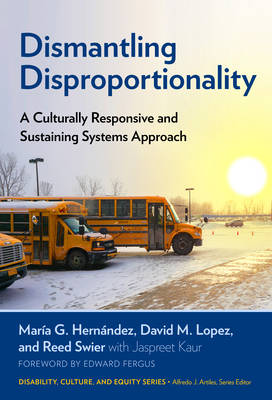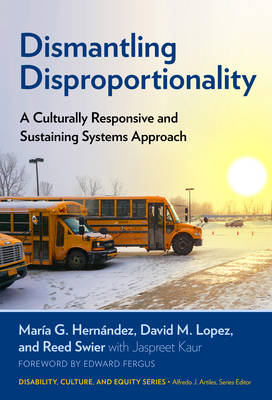
- Retrait gratuit dans votre magasin Club
- 7.000.000 titres dans notre catalogue
- Payer en toute sécurité
- Toujours un magasin près de chez vous
- Retrait gratuit dans votre magasin Club
- 7.000.0000 titres dans notre catalogue
- Payer en toute sécurité
- Toujours un magasin près de chez vous
Dismantling Disproportionality
A Culturally Responsive and Sustaining Systems Approach
María G Hernández, David M Lopez, Reed SwierDescription
This book positions disproportionality as not solely a special education issue but, rather, a broader issue of educational inequality. Disproportionality in special education parallels a persistent history of chronic socioeconomic and racial inequalities relating to the country's history of denying educational opportunities to students of color, multilingual students, students with disabilities, and those at the intersections of these identities. This book draws on the authors' experiences as technical assistance providers with the Center for Disproportionality, coupled with the latest research findings on the causes of racial disproportionality in general and special education. Dismantling Disproportionality examines four district case studies, showing how each progresses from theory to practice in delivering educational services to all students. The authors conclude that the most effective way to address disproportionality is to use a culturally responsive educational systems approach that critically engages practitioners at the intersection of beliefs, policies, procedures, and practices.
Book Features:
- Offers a concrete, multipronged approach to disrupt and dismantle disproportionality in education.
- Takes a systemic approach to disproportionality that centers culturally responsive and sustaining education.
- Describes a framework that can be used at the teacher and school building level, in teacher and leadership preparation programs, and with districts and state education agencies.
- Provides useful reflection questions, key takeaways, and tools for readers.
Spécifications
Parties prenantes
- Auteur(s) :
- Editeur:
Contenu
- Nombre de pages :
- 192
- Langue:
- Anglais
- Collection :
Caractéristiques
- EAN:
- 9780807767368
- Date de parution :
- 25-11-22
- Format:
- Livre broché
- Format numérique:
- Trade paperback (VS)
- Dimensions :
- 156 mm x 227 mm
- Poids :
- 267 g

Les avis
Nous publions uniquement les avis qui respectent les conditions requises. Consultez nos conditions pour les avis.






